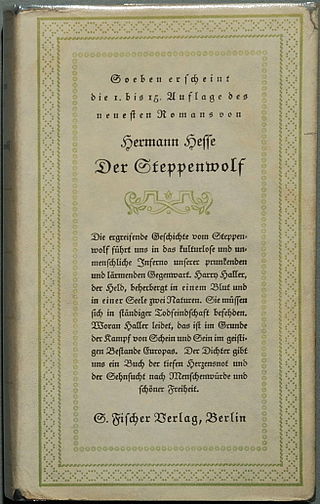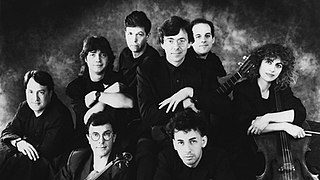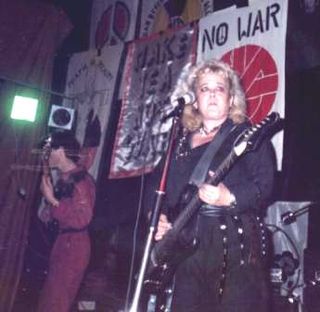
A musical ensemble, also known as a music group or musical group, is a group of people who perform instrumental and/or vocal music, with the ensemble typically known by a distinct name. Some music ensembles consist solely of instrumentalists, such as the jazz quartet or the orchestra. Other music ensembles consist solely of singers, such as choirs and doo-wop groups. In both popular music and classical music, there are ensembles in which both instrumentalists and singers perform, such as the rock band or the Baroque chamber group for basso continuo and one or more singers. In classical music, trios or quartets either blend the sounds of musical instrument families or group instruments from the same instrument family, such as string ensembles or wind ensembles. Some ensembles blend the sounds of a variety of instrument families, such as the orchestra, which uses a string section, brass instruments, woodwinds, and percussion instruments, or the concert band, which uses brass, woodwinds, and percussion.

Steppenwolf is the tenth novel by German-Swiss author Hermann Hesse.

Steppenwolf was an American rock band that was prominent from 1968 to 1972. The group was formed in late 1967 in Los Angeles by lead singer John Kay, keyboardist Goldy McJohn, and drummer Jerry Edmonton, all formerly of the Canadian band the Sparrows. Guitarist Michael Monarch and bass guitarist Rushton Moreve were recruited via notices placed in Los Angeles-area record and musical instrument stores.

Jeremy Webster "Fred" Frith is an English multi-instrumentalist, composer, and improviser.

Henry Threadgill is an American composer, saxophonist and flautist. He came to prominence in the 1970s leading ensembles rooted in jazz but with unusual instrumentation and often incorporating other genres of music. He has performed and recorded with several ensembles: Air, Aggregation Orb, Make a Move, the seven-piece Henry Threadgill Sextett, the twenty-piece Society Situation Dance Band, Very Very Circus, X-75, and Zooid.

The Penguin Cafe Orchestra (PCO) were an avant-pop band led by English guitarist Simon Jeffes. Co-founded with cellist Helen Liebmann, it toured extensively during the 1980s and 1990s. The band's sound is not easily categorized, having elements of exuberant folk music and a minimalist aesthetic occasionally reminiscent of composers such as Philip Glass.

The Poison Girls were an English anarcho-punk band from Brighton. The singer/guitarist, Vi Subversa, was a middle-aged mother of two at the band's inception, and wrote songs that explored sexuality and gender roles, often from an anarchist perspective. The original Poison Girls line-up also included: Lance D'Boyle (drums); Richard Famous (guitar/vocals); Nil ; and Bernhardt Rebours (bass/synthesiser/piano).

Our Time in Eden is the fifth studio album by American alternative rock band 10,000 Maniacs. It was released in 1992 on Elektra Records. The release is 10,000 Maniacs' last studio album with original lead singer Natalie Merchant. The album included her future replacement Mary Ramsey on violin and viola on such tracks as "Stockton Gala Days" and "How You've Grown". Singles released from the album were "These Are Days", "Candy Everybody Wants" and "Few and Far Between". The brass and woodwind section is covered by the J.B.'s, or James Brown's band. The album had the working title African Violet Society.
Yndi Halda are an English post-rock band from Kent. "Yndi Halda" is Old Norse for "Enjoy Eternal Bliss", also the name of their debut release. The band's music is characterised by expansive, cinematic pieces that have seen them compared to post-rock and modern classical genres.

Jason White is an American musician, best known for being the touring guitarist of the rock band Green Day, with whom he has performed since 1999. He has worked with the band in the studio and on tour, and has appeared in various music videos with the band, including "When I Come Around", "Wake Me Up When September Ends", "21 Guns", "Last of the American Girls", and "Dilemma". He joined the group in the studio as a session member for the band’s 2012 trilogy, ¡Uno!, ¡Dos!, and, ¡Tré!. Prior to working with Green Day, he was a member of the punk band Pinhead Gunpowder, which also featured Green Day vocalist Billie Joe Armstrong. White has also been a member of a number of Green Day side projects including Foxboro Hot Tubs, The Network, and The Coverups among others.

Sigurd Eystein Køhn was a Norwegian jazz saxophonist and composer.

Penguin Cafe Orchestra is the second studio album by the Penguin Cafe Orchestra, released in 1981, and recorded between 1977 and 1980. By this album, the line-up for the band had expanded greatly, with contribution including Simon Jeffes, Helen Leibmann, Steve Nye, Gavyn Wright of the original quartet, as well as Geoff Richardson, Peter Veitch, Braco, Giles Leamna, Julio Segovia and Neil Rennie. All pieces were composed by Simon Jeffes except for "Paul's Dance", "Cutting Branches" (traditional), and "Walk Don't Run". The cover painting is by Emily Young.

Astounding Sounds, Amazing Music is the sixth studio album by the British rock band Hawkwind, released in 1976. It reached No. 33 on the UK album charts.
Simon Lenski is a cello player from Antwerp, Belgium. His main activity lies within the band DAAU which he co-founded in 1992.

Gary Husband is an English jazz and rock drummer, pianist, keyboard player and bandleader. He is also a composer, arranger and producer.
The Michael Nyman Band, formerly known as the Campiello Band, is a group formed as a street band for a 1976 production of Carlo Goldoni's 1756 play, Il Campiello directed by Bill Bryden at the Old Vic. The band did not wish to break up after the production ended, so its director, Michael Nyman, began composing music for the group to perform, beginning with "In Re Don Giovanni", written in 1977. Originally made up of old instruments such as rebecs, sackbuts and shawms alongside more modern instruments like the banjo and saxophone to produce as loud a sound as possible without amplification, it later switched to a fully amplified line-up of string quartet, double bass, clarinet, three saxophones, horn, trumpet, bass trombone, bass guitar, and piano. This lineup has been variously altered and augmented for some works.

Ryan Cohan is a jazz pianist and composer. His style is a blend of world rhythms, traditional jazz, and classical.
The Sessions Band is an American musical group that has periodically recorded and toured with American rock singer-songwriter Bruce Springsteen in various formations since 1997.
Sirius.B is an eight-piece musical group from Asheville, nc. It was formed in late 2006 by Xavier Ferdón, Pancho Romero Bond, and Imhotep and takes its name from the white dwarf star, Sirius B. Sirius.B combines accordion, violin, cello, acoustic guitar, flamenco and electric guitar, charango, banjo, percussion, drums, upright bass, melodica, clarinet, and multi-lingual vocals to create a worldly or otherwise otherworldly sound.

Private Suit is the fourth studio album by Dutch indie rock band Bettie Serveert, and their first to be released on Parasol Records. It was released on 5 September 2000 through Parasol's subsidiary Hidden Agenda Records. It received generally favorable reviews from critics, with a score of 80 out of 100 on the critic review aggregator site Metacritic. One critic who did not like the album was Keith Harris, who wrote in the Chicago Reader that he thought the album "sounded false".















